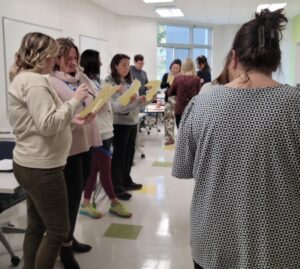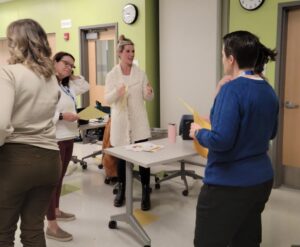The Five S’s of Continuous Improvement Taking Hold in Wynantskill: A Second in our Series of Updates from NYKids’ COMPASS Partners
By Kristen C. Wilcox and Lisa Graham-Donato
As the second in a series on NYKids’ partner schools’ improvement efforts, this week we are focusing on Wynantskill Union Free School District. We continue to draw on the 5S Framework for problem identification in improvement focused education research as discussed in detail by Hinnant-Crawford and Anderson in the Foundational Handbook on Improvement Research in Education.
The 5S framework outlines five considerations for educators as they design their improvement initiatives: significance, source, substantive focus, scale, and scope. Where did Wynantskill’s COMPASS team arrive and where are they headed next?
Wynantskill: Focusing in on Culture and Climate
Significance – Associated Question: Why are we doing this work?
 The team of elementary and middle school teachers as well as principal and superintendent agreed that their school culture and climate were top in the “significance” category. After engaging with questions about their “Why?” and associated priorities – especially in light of pandemic-era impacts on students, families, and staff – the Wynantskill COMPASS team members moved on to interrogate what has caused their culture and climate to not be where they want them to be. NYKids staff added in some suggestions to distinguish culture (i.e. norms, values, beliefs) from climate (i.e. the atmosphere inviting feelings of safety and care)– something that a number of NYKids’ studies has pointed to be as being an important distinction as each requires unique drivers for improvement.
The team of elementary and middle school teachers as well as principal and superintendent agreed that their school culture and climate were top in the “significance” category. After engaging with questions about their “Why?” and associated priorities – especially in light of pandemic-era impacts on students, families, and staff – the Wynantskill COMPASS team members moved on to interrogate what has caused their culture and climate to not be where they want them to be. NYKids staff added in some suggestions to distinguish culture (i.e. norms, values, beliefs) from climate (i.e. the atmosphere inviting feelings of safety and care)– something that a number of NYKids’ studies has pointed to be as being an important distinction as each requires unique drivers for improvement.
Source – Associated Question: What is causing the problem?
The team discussed the need to prioritize empathy and positivity. Making the connections between gaps in students’ social-emotional development experiences during the pandemic and student motivation and behavior in school was an important part of the conversation. Team members questioned what they could do to improve student-student and student-staff relationships in the coming year.
Substantive Focus – Associated Question: How should/could we intervene to address the problem?
Wynantskill COMPASS team members revisited change ideas discussed in previous COMPASS meetings such as initiating an anonymous mentor program to help connect children who exhibit a need for social-emotional support with a trusted adult in the building. The team also agreed to use a system to identify students who engage in positive behaviors as one way to emphasize the school’s desired character traits specifically regarding peer-to-peer interactions. Finally, the team committed to showcasing these exemplar students in various school spaces.
Scale – Associated Question: Whose knowledge and expertise do we need to solve this problem?
One of NYKids’ roles in supporting improvement efforts is to provide a knowledge and expertise-sharing function and so, as NYKids team members often do, we shared examples of ways COMPASS partner school Oppenheim-Ephratah St. Johnsville (OESJ) kicked off their school year by articulating a motivational talk on their Why? and encouraged Wynantskill COMPASS team members to consider how they might craft some vision and mission resources of their own.
 In addition, The NYKids team suggested examining NYKids’ study school Forest Road Elementary School and specifically how educators there used a “Red Zone” process to track students with academic or other needs and ensure timely interventions.
In addition, The NYKids team suggested examining NYKids’ study school Forest Road Elementary School and specifically how educators there used a “Red Zone” process to track students with academic or other needs and ensure timely interventions.
Drawing on NYKids’ research-practice partnership with Tech Valley High School , NYKids team members shared some approaches TVHS educators use to encourage an inclusive environment through special student groups.
Scope – Associated Question: Where does this problem live? Is it unique to a department, school, district or is it a shared problem?
The need to rebuild a culture of high expectations for performance and behavior and a climate of care and positivity was recognized as a shared problem across grade levels, albeit manifesting in unique ways among children and youth with different needs and in different stages of development.
The meeting concluded with commitments to follow through with implementing promising change ideas and collecting information about impacts over the remainder of the school year. An “end-of-year check the pulse” meeting will be scheduled before the close of the school year to examine lessons learned and plan for the next cycle of improvements.
We love to hear from you and welcome all your questions and/or feedback on our and our partners’ work at nykids@albany.edu. Please reach out if you are interested in direct support for your improvement efforts. We also invite you to follow us on Facebook, X, Instagram, and LinkedIn.
